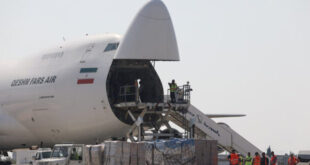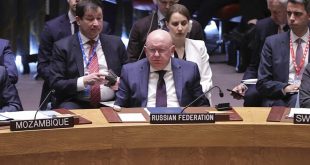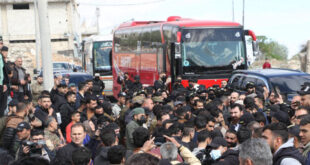Provinces, SANA – The European al-Wafaa Campaign carried out Tuesday the distribution of food aid in 1000 shares to needy people in the terrorists-besieged al-Yarmouk Camp, which is home to Palestinian refugees.
It was the second day of the process, with 700 portions were already distributed on Tuesday within the campaign’s 10th relief convoy launched early yesterday which includes 10,000 food baskets.

Chief of the campaign Amin Abu Rashed affirmed in a statement to SANA that distribution of aid tomorrow will cover the areas of Yelda and Jaraman city in the countryside of the capital.
The city of Aleppo and al-Nayrab Camp, also home to Palestinian refugees, will be next to receive aid, he added, noting that all the food items have been bought from inside Syria.
The distribution process is being carried out in cooperation with the Syrian government and Syria Trust for Development, a non-profit NGO that was established in 2001 to empower individuals and communities in Syria to fulfill their role in building their society and shaping their future.
Director of the Humanitarian Support Department at the Trust Rosa Jereri told SANA that the Trust and al-Wafa Campaign share a signed agreement to distribute relief supplies to needy families and those who have been affected by the ruinous terrorist war raging in the country.
The tenth convoy, she said, targets basically areas inhabited by Palestinians inside al-Yarmouk camp. Aid will also be delivered to other Palestinian and Syrian families, including in other provinces.
“We have worked in partnership with the Campaign to target many Syrian provinces, including Damascus, its countryside, Lattakia, Sweida and Daraa,” she added.
All facilitations have been provided by the Syrian government to access and deliver aid in terrorism-affected areas, Jereri pointed out.
Aid delivery and distribution has been going on nonstop by the Syrian state, as Director of the General Commission of the Arab Palestinian Refugees Ali Mustafa affirmed.
The Syrian state, he said, “is doing its humane and moral duty in this regard” and “doesn’t need any international resolutions.”
Mustafa explained that the Commission, together with the United Nations Relief and Works Agency for Palestine Refugees in the Near East (UNRWA) and the Syrian state-run Higher Relief Commission, have been distributed aid to the Syrian and Palestinian residents of the camp alike, by 600-700 baskets per day.

He made it clear that whatever delay that has happened or could once again occur in the process of aid distribution or evacuation of critical cases from the camp is put down to the acts of the terrorist groups who “block people from accessing sites of distribution.”
The terrorist groups, he added, have also repeatedly shelled aid convoys and workers.
By acting like that, Mustafa said, “the terrorists in the camp try to portray the situation as if there is a tragedy and they are the victims.”
“This is incorrect, and the aim of such talk is to politicize the Palestinian cause and the humanitarian aid issue,” he added.
An estimated 33,000 food boxes and portions have made their way into the camp and delivered to the people in need since distribution started, while more than 4,400 critical cases, including sick people, and students, have been evacuated.
The 9th aid convoy organized by the European Campaign arrived on the Syrian-Lebanese border last May, carrying 180 tons of relief supplies and two ambulances.
In Moadamiet al-Cham in Damascus Countryside, four lorries loaded with humanitarian aid, provided by the UN and humanitarian associations, have entered the area. The process was carried out in cooperation with the Syrian government and in coordination with the national reconciliation committees.
Earlier on Monday, 1000 baskets containing food and health supplies entered the area. The total aid is 4000 baskets, bound for 20,000 families, distribution is expected to last for 4 days.
In Qamishli, Hasaka province, the seventh aid airlift of the third air bridge opened by the United Nations Higher Commissioner for refugees “UNHCR” arrived in the airport of the city on Tuesday.
Head of the UNHCR Bureau in Qamishli Maha Sudqi told SANA reporter that the aid contains blankets, kitchen tools, health baskets and other materials.
The air-bridge includes 11 planes with a total cargo of 440 tons of humanitarian aid earmarked to about 50 thousands of people affected by the crisis in the country, including needy and displaced families.
H. Said/ M. Nassr
 Syrian Arab News Agency S A N A
Syrian Arab News Agency S A N A




